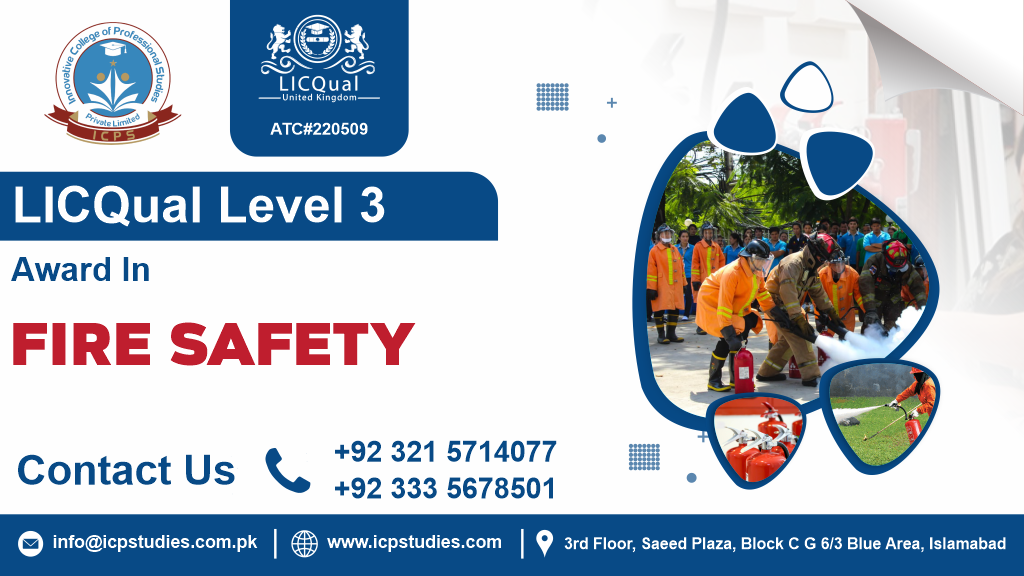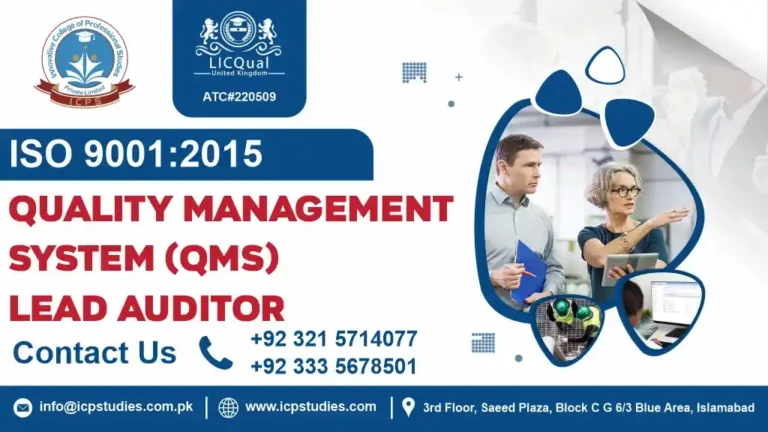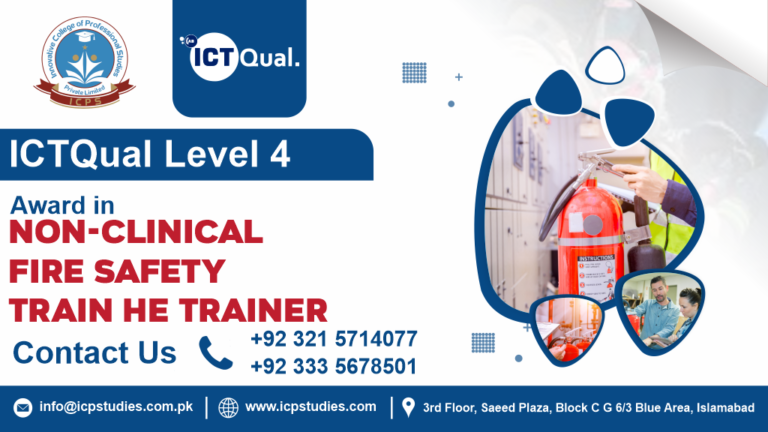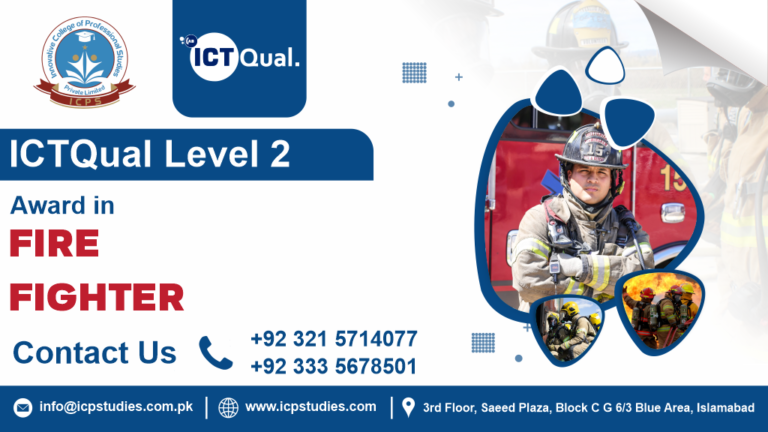This prestigious program is tailored for seasoned professionals seeking to deepen their knowledge and refine their skills in fire safety management. Delve into advanced topics such as fire dynamics, fire safety engineering, fire risk analysis, and strategic fire safety planning under the guidance of industry experts.
Achieving the LICQual Level 3 Award in Fire Safety sets you apart as a leader in the field, recognized for your exceptional competency and dedication to excellence. Stand out from the crowd and enhance your professional credibility with this prestigious certification.
Whether you’re aiming for senior management positions, consultancy roles, or academic pursuits, the Level 3 Award in Fire Safety opens doors to exciting career opportunities. Command respect and unlock new career pathways as a sought-after expert in fire safety management.
Stay ahead of the curve with the latest advancements and best practices in fire safety management. Explore emerging trends, innovative technologies, and industry developments to drive continuous improvement and innovation in fire safety practices.
Beyond acquiring technical expertise, the Level 3 Award in Fire Safety fosters personal and professional growth. Enhance your leadership skills, critical thinking abilities, and decision-making capabilities to navigate complex fire safety challenges with confidence and poise.
Don’t miss this unparalleled opportunity to take your career to the next level and become a trailblazer in fire safety management. Enroll now in the LICQual Level 3 Award in Fire Safety today and unlock a world of possibilities in fire safety management.
All About Level 3 Award in Fire Safety
Course Overview
The LICQual Level 3 Award in Fire Safety course is an advanced training program designed for professionals who seek to deepen their expertise and leadership capabilities in fire safety management. Developed by industry experts, this comprehensive course goes beyond the fundamentals covered in lower-level certifications and focuses on advanced topics essential for managing complex fire safety challenges effectively.
Participants will delve into the intricacies of fire dynamics, exploring topics such as fire behavior, combustion principles, heat transfer mechanisms, and smoke movement. Understanding these advanced concepts is crucial for predicting fire behavior and developing effective fire safety strategies.
The course covers principles of fire safety engineering, including fire-resistant construction, building codes and standards, fire suppression systems, and structural fire protection. Participants will learn how to apply engineering principles to design buildings and structures with enhanced fire safety features.
Participants will develop skills in strategic fire safety planning, including risk-based decision-making, cost-benefit analysis, and prioritization of fire safety measures. Emphasis is placed on developing comprehensive fire safety plans that address the unique needs and challenges of different environments.
The course explores advanced techniques for conducting fire risk analysis, including probabilistic risk assessment, fault tree analysis, and consequence modeling. Participants will learn how to identify, quantify, and prioritize fire risks to inform decision-making and resource allocation.
Upon successful completion of the LICQual Level 3 Award in Fire Safety course, participants typically receive a prestigious certification that demonstrates their advanced competency and leadership in fire safety management. This certification enhances credibility, career prospects, and opportunities for professional advancement in roles such as fire safety consultants, senior health and safety managers, facility directors, and fire safety engineers.
Study Units
Learning Outcomes
Here are the outcomes associated with each of the study units:
. Fire Triangle and Fire Behavior:
- Understand the components of the fire triangle and their role in sustaining combustion.
- Identify the factors influencing fire behavior, including heat, fuel, oxygen, and chemical reactions.
- Recognize how changes in environmental conditions and materials impact fire development and spread.
- Apply knowledge of fire behavior to assess fire risks, develop prevention strategies, and respond effectively to fire emergencies.
2. Common Causes of Fires:
- Identify common sources and causes of fires in various environments, including residential, commercial, industrial, and outdoor settings.
- Understand human behaviors, equipment failures, electrical faults, heating systems, cooking appliances, and other factors that contribute to fire incidents.
- Analyze case studies and real-world examples to recognize patterns and trends in fire causation.
- Develop proactive measures and safety protocols to mitigate fire risks and prevent future incidents.
3. Fire Safety Legislation and Regulatory Requirements:
- Gain knowledge of fire safety legislation, regulations, and standards applicable to different jurisdictions and industries.
- Understand the legal responsibilities of employers, building owners, managers, and individuals regarding fire safety compliance.
- Interpret and apply relevant regulations to ensure that buildings, facilities, and operations meet minimum fire safety requirements.
- Implement measures to maintain compliance with fire safety laws, including documentation, training, inspections, and reporting.
By mastering these study units and achieving the associated outcomes, participants will be equipped with the knowledge and skills necessary to effectively prevent, identify, and respond to fire emergencies in diverse settings. This comprehensive understanding of fire behavior, common causes of fires, and fire safety legislation is essential for promoting safety, minimizing risks, and ensuring compliance with regulatory requirements.
Admission Criteria
Here are the typical entry requirements for the LICQual Level 3 Award in Fire Safety course:
- Completion of Lower-Level Fire Safety Courses: Prospective participants are usually required to have completed lower-level fire safety courses, such as the LICQual Level 1 and Level 2 Awards in Fire Safety, or hold equivalent certifications. These foundational courses provide essential knowledge and skills in fire safety principles, risk assessment, and management, serving as prerequisites for the advanced Level 3 course.
- Relevant Work Experience: While not always mandatory, having relevant work experience in fields related to health and safety, facilities management, fire safety engineering, or emergency response is highly beneficial. Practical experience provides context for understanding course materials and applying concepts to real-world situations.
- Educational Background: There are typically no formal educational prerequisites for enrolling in the Level 3 Fire Safety course. However, participants should have a strong foundation in literacy, numeracy, and critical thinking skills to engage with advanced course materials, analyze complex concepts, and complete assessments.
- Commitment to Continuing Education: Enrolling in the Level 3 Fire Safety course requires a commitment to continuing education and professional development in the field of fire safety management. Participants should demonstrate a genuine interest in advancing their knowledge, skills, and expertise to contribute to safer environments and communities.
- Health and Fitness: Participants should be in good health and physical condition to engage in practical activities, such as emergency response simulations, site visits, and hands-on exercises. Individuals with mobility issues or health conditions that may impact their ability to participate in physical activities should inform course organizers in advance to ensure appropriate accommodations can be made.
- Language Proficiency: Since the course materials and assessments are typically conducted in English, participants should have a sufficient level of proficiency in the language to understand and engage with the content effectively. Strong reading, writing, and verbal communication skills are essential for success in the Level 3 Fire Safety course.
- Compliance with Local Regulations: Depending on the jurisdiction, there may be specific regulatory requirements or prerequisites for enrolling in advanced fire safety courses. Participants should ensure they meet any local or industry-specific requirements before enrolling in the Level 3 Fire Safety course.
By ensuring that participants meet these entry requirements, course organizers can optimize the learning experience and ensure that individuals are adequately prepared to engage with the advanced course content and achieve the desired learning outcomes in fire safety management at the highest level.
Ideal Candidate
This course is ideal for:
- Experienced Fire Safety Professionals: Individuals with extensive experience in fire safety management, including fire safety officers, consultants, engineers, and inspectors, will benefit greatly from this course. The Level 3 Award offers an opportunity to deepen their knowledge, refine their skills, and stay updated with the latest advancements in the field.
- Health and Safety Managers: Seasoned health and safety managers who oversee fire safety practices within organizations will find this course invaluable for enhancing their leadership capabilities and strategic planning skills. The advanced training provided in the Level 3 course equips them to develop and implement comprehensive fire safety programs tailored to their organization’s needs.
- Facility Directors and Building Managers: Individuals responsible for managing buildings, facilities, or properties have a critical role in ensuring fire safety compliance and maintaining a safe environment for occupants. The Level 3 Award in Fire Safety equips facility directors and building managers with the expertise to conduct advanced risk assessments, implement fire safety engineering solutions, and develop strategic fire safety plans.
- Fire Safety Consultants: Fire safety consultants who provide expert advice and guidance to organizations across various industries can enhance their credentials and expand their service offerings by completing the Level 3 course. The advanced training enables consultants to deliver high-quality assessments, recommendations, and solutions that address complex fire safety challenges effectively.
- Emergency Response Leaders: Professionals designated as emergency response leaders or coordinators play a crucial role in managing fire emergencies and ensuring the safety of occupants. The Level 3 course provides advanced training in emergency response leadership, enabling individuals to develop and implement comprehensive emergency plans, coordinate response efforts, and mitigate risks during fire incidents.
- Safety Professionals Seeking Career Advancement: For safety professionals looking to advance their careers and take on leadership roles in fire safety management, the Level 3 Award offers a pathway to professional growth and advancement. Certification at this level demonstrates mastery and expertise in fire safety management, opening doors to senior management positions, consultancy roles, and academic pursuits.
Overall, the LICQual Level 3 Award in Fire Safety course is designed for professionals who are committed to excellence in fire safety management and aspire to become leaders and experts in the field. Whether you’re seeking to deepen your knowledge, expand your skills, or advance your career, this advanced training program provides the necessary tools and resources to achieve your goals and make a significant impact in fire safety practices and outcomes.
FAQs about Level 3 Award in Fire Safety







